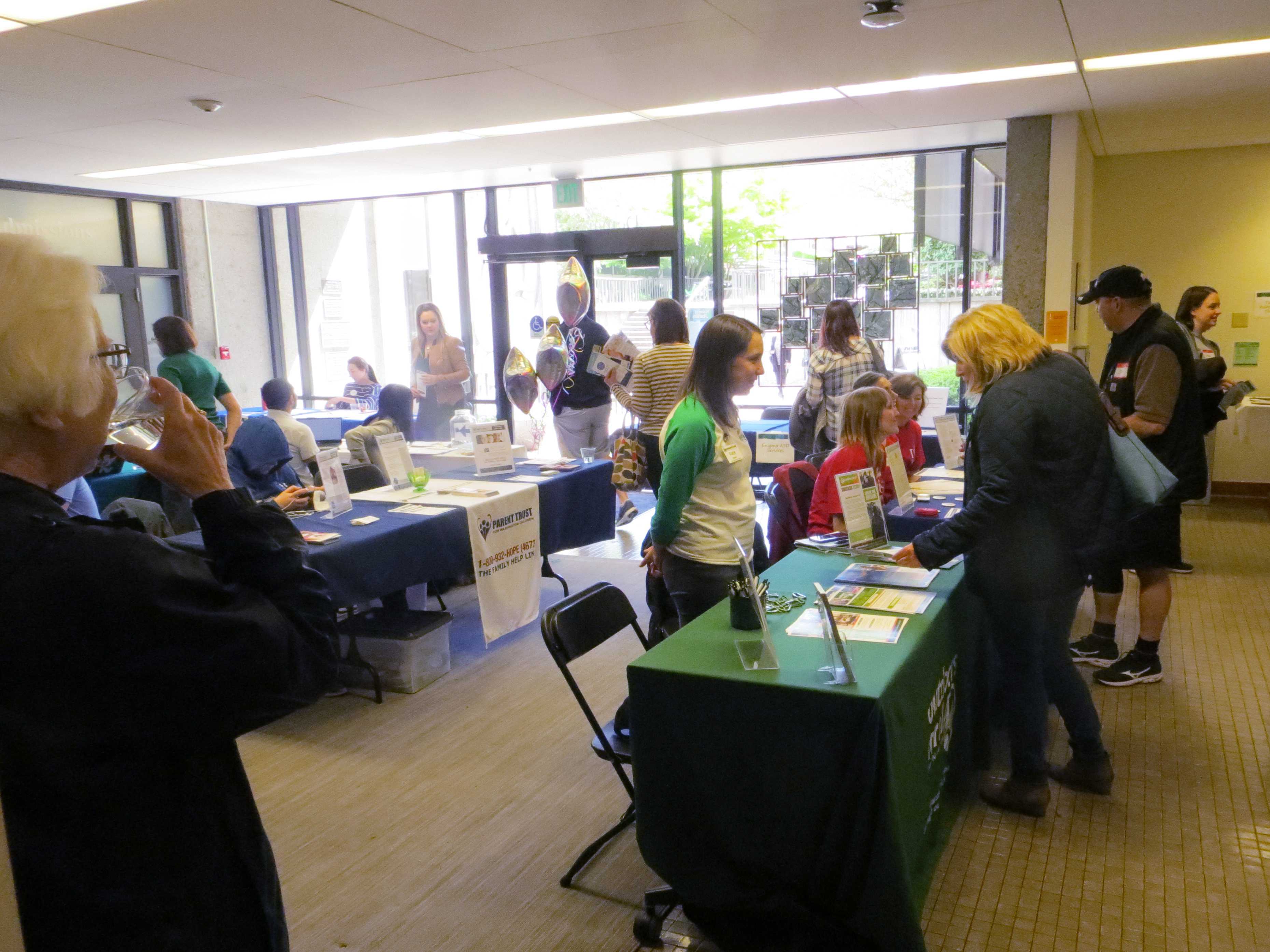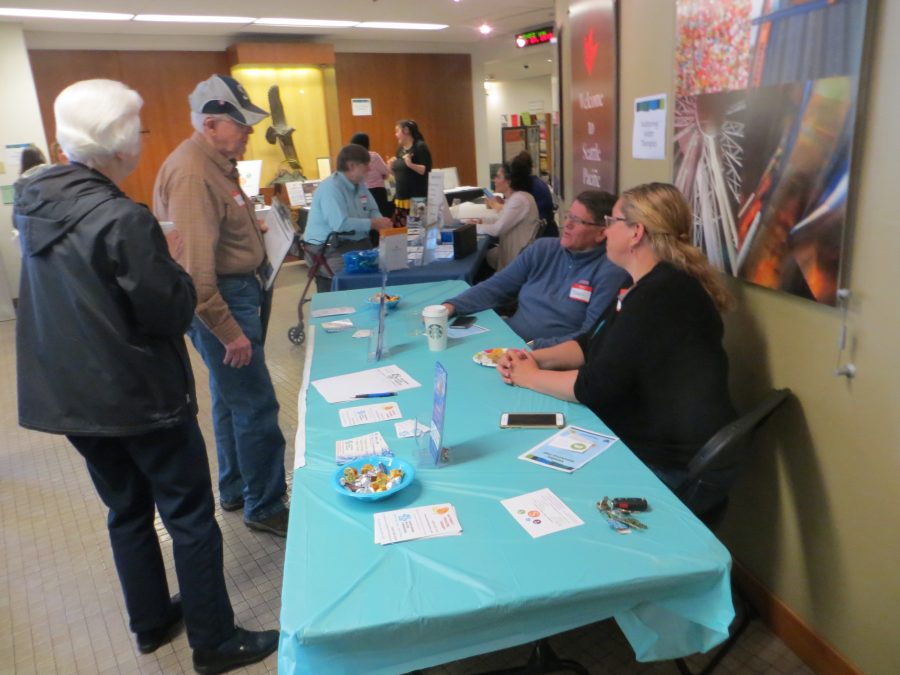Featured image: Participants learn about Nurturing Water Therapy. Julia Battishill | The Falcon
Colorful tables and enthusiastic vendors created an intentionally inviting atmosphere in lower Demoray on the afternoon of April 27, as families and students alike wandered through the resource fair before the keynote speech at the annual Voices of Autism event.
This year’s keynote speaker, psychologist Dr. Allison Brooks, gave her presentation for the second half of the event. The first half was dedicated to giving attendees time to visit each table and see the resources presented there. In attendance were students, curious onlookers wanting to educate themselves on the topic, and families.
Resources included Washington Autism Alliance and Advocacy, Community Care, Outdoors For All, Nurturing Water, Turning Point Speech Therapy, and PROVAIL.
PROVAIL is an organization dedicated to supporting people with disabilities to, in the words of their mission statement, “fulfill their life choices.”
“[PROVAIL is] a multi-service agency that provides services for people with disabilities,” explained a representative at the table. They continued, explaining the specificities of PROVAIL’s work in the community.
“A lot of our services are actually in school to work, and transition services, and our customized employment services as well. We work with individuals who have barriers to employment due to a disability, and help them find a job and coach them on their job so they can be successful,” they said.
Outdoors For All aims to make outdoor recreation accessible to everyone by making all activities adaptive, according to a present representative. They “provide activities for both kids and adults with disabilities,” said the representative, including summer sports such as kayaking, cycling, hiking, rock-climbing, as well as winter sports such as skiing and snowboarding.

Also present at the resource fair were two SPU music therapy students, who had set up their table with a colorful tri-fold poster and flyers. Their intention was to spread awareness about the program and let people know about the available resources. They said that they also hoped to see a prospective student or two, to inform them about the program and see if they could peak their interest.
The resource fair lead into the keynote speech titled “You Are Your Child’s Most Important Educational Advocate,” which was given by Brooks. Brooks is now a psychologist with a Ph.D., but she got into the field of special education when she was still a teenager.
Brooks opened her presentation by telling the audience about three children she had worked with over the course of her career, beginning with a fourteen-year-old girl named Sabrina.
Brooks was still in high school when she began to work with Sabrina, and had no experience working with people on autism spectrum. She worked with Sabrina in her home, as she was homeschooled, and learned not to underestimate someone’s intelligence based on a disability.
From that point in her story, Brooks shared the way her experience working with kids on the autism spectrum quickly grew. Often, this was due to the misguided belief of many that, “You’ve worked with someone with autism, you can do this. Right?” Brooks said, with a laugh, before explaining the distinct differences between every person on the autism spectrum.
Nevertheless, the “You can do this, right?” mindset that others had lead her into many opportunities to work with autistic children, from working in diagnostics to being a one-on-one paraeducator. There were other impactful children like Sabrina, such as Hanna and Ruth, and more experiences in schools, which all furthered her understanding.
She went on to talk about Brooks Powers Group, the organization that she founded with Board Certified Behavior Analyst Tom Powers, Ph.D. in educational psychology.
“We wanted to start it because we were frustrated by the kinds of services that were available to people in our community,” said Brooks. They could not give the kind of support they wanted to, and they wanted to do things their way.
The pair faced many naysayers and rejections in the process of starting the organization, especially from their professors and other respected colleagues in their field that they turned to for advice in the beginning stages.
Brooks remembers a professor, who she says she has a great deal of respect for still, telling her “If that was a viable model, somebody else would have done it by now.”
“So,” Brooks continued with a smile, “we took that information, and we went ahead and did it anyway.”
Their organization now has 25 employees on board, and is very successful. They are able to provide the services and help that they know their community needs.
“‘We don’t have that here’ is not an acceptable reason to not provide services that are necessary,” said Brooks. “We can’t not have appropriate services for kids just because they don’t exist yet.”
Brooks dedicated most of the rest of her talk explaining to parents the best ways they can be advocating for their children to get the services they need.
She connected with the parents in the room and garnered a positive response from the audience, as she shared her own parenting stories as well as her perspective as a psychologist on the other side of the process.
Over this portion of her talk she spoke to transition services, law specificities, ways to navigate meetings and advocate for children effectively, and finding resources. One of her most emphasized points was one that she repeatedly mentioned throughout; the importance of coordination and collaboration of care.
“You might have noticed that I have been talking about collaboration and coordination of care all along,” said Brooks, “because I believe that it’s a really critical piece of what makes life and intervention and support accessible for people with autism spectrum disorders.”

















































































